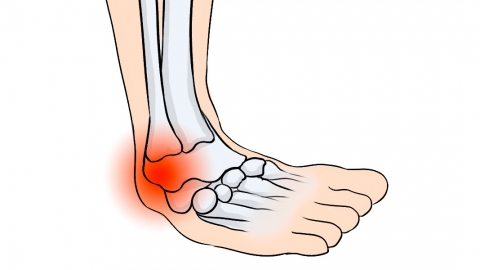What could be causing my ankle to be swollen and extremely painful?
Generally, swelling and severe pain in the ankle may be caused by trauma, prolonged standing or walking, ankle sprain, gouty arthritis, or lower extremity varicose veins with thrombosis. It is recommended to seek medical attention promptly, identify the underlying cause, and receive symptomatic treatment under a doctor's guidance. Specific causes are analyzed as follows:

1. Trauma: When the ankle suffers external impact or compression, it can lead to local soft tissue injury and capillary rupture, resulting in swelling and pain. Immediately stop activity and rest in a seated or lying position, elevating the ankle above heart level. Apply ice packs within the first 48 hours to reduce swelling; switch to heat therapy after 48 hours to promote recovery.
2. Prolonged Standing or Walking: Maintaining a standing or walking posture for extended periods places continuous stress on the ankle, impairing blood return and causing fluid accumulation locally, leading to swelling and pain. Rest for 10–15 minutes every hour of standing or walking, during which gentle ankle massage—pushing and kneading from the toes toward the ankle—can be performed.
3. Ankle Sprain: Sudden twisting of the ankle during exercise or walking may stretch or tear ligaments, causing swelling, pain, and limited mobility. Patients may apply medications such as diclofenac diethylamine gel, Yunnan Baiyao aerosol, or safflower oil to the affected area as directed by a physician to relieve pain.
4. Gouty Arthritis: Excessively high uric acid levels in the body lead to deposition of urate crystals in the ankle joint, triggering an inflammatory response that results in ankle swelling and intense pain, often occurring at night or early morning. Patients should take medications such as colchicine tablets, etoricoxib tablets, or allopurinol tablets as prescribed to control inflammation and lower uric acid levels.
5. Lower Extremity Varicose Veins with Thrombosis: Incompetent venous valves in the legs impede blood return, leading to chronic blood pooling and increased risk of clot formation, which blocks blood vessels and causes ankle swelling, pain, and elevated skin temperature. Patients must take anticoagulant medications such as rivaroxaban tablets, dabigatran etexilate capsules, or warfarin sodium tablets as directed by their doctor.
In daily life, keep the ankles warm and avoid exposure to cold. Warm up thoroughly before exercising and avoid sudden strenuous activities. If ankle discomfort occurs, avoid forceful self-massage to prevent worsening injury, and instead use scientific care methods to support recovery.








